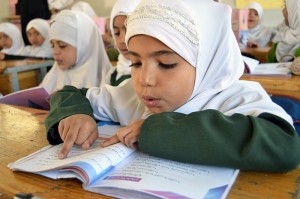[vc_row][vc_column width=”1/1″][vc_column_text]
Master trainers mobilize Yemeni parents for reading support
By Salwa Al-Azzani and Maree Melican
[/vc_column_text][/vc_column][/vc_row][vc_row][vc_column width=”2/3″][vc_column_text]Sana’a, Yemen—Greater parental involvement in a child’s education not only improves student achievement but also leads to higher quality education and better schools, several studies show. In Yemen, educators and parents often struggle with how to jumpstart and sustain meaningful parent engagement.
An innovative, phonics-based literacy program called the Yemen Early Grade Reading Approach is resolving this dilemma by mobilizing Master Trainers to rally community support for early grade reading and equip parents with specific tools to take an active role in their children’s education.
 Master Trainers utilize a parent training manual that features 13 key visual messages on the importance of reading for children and how parents can support reading skills at home and in school.
Master Trainers utilize a parent training manual that features 13 key visual messages on the importance of reading for children and how parents can support reading skills at home and in school.
The manual provides guidance on topics from school preparation and making home a “language rich” environment to tracking student performance.
During the three-day training in Sana’a, 15 Master Trainers from the governorates of Amant Al-Asimah, Ibb, Abyan and Rayma learned facilitation methods to instruct social workers, headmasters and ultimately parents, particularly those with low levels of literacy themselves, on effective ways to support a child’s reading development.
Illiteracy levels in the country are nearly 35 percent. For women, illiteracy rates reach 60 percent.
“The activities in this training are excellent and have motivated me to help mobilize the community to support reading, which will help strengthen the relationship of the school with the community,” said Mansoor Ali Saleh, a Master Trainer from the Al-Jabeen district in Rayma governorate.
The Yemen Early Grade Reading Approach is part of the Community Livelihoods Project, which is funded by the U.S. Agency for International Development and implemented by Creative Associates International.
Yemen’s Ministry of Education, a key partner in the initiative, is expanding the Yemen Early Grade Reading Approach to schools in all 23 governorates nationwide. At the end of this academic year, 16,628 schools will be participating.[/vc_column_text][vc_column_text]
Master Trainers spark a chain reaction
The Master Trainers will have a reverberating effect on support for education in their communities.
Through those they train directly and subsequent sessions conducted by others, they will instruct 11 school social workers at the district level, 417 school social workers and headmasters in 204 new schools and ultimately 15,000 parents on best practices to support early grade reading.
“Conducting regular sessions with parents and [Mother/Father Councils] will activate their role in supporting the school and will give them the skills and knowledge to solve many of the educational problems facing the school and children, especially with reading,” says Adeela Ahmed Al-Khader, a Master Trainer from the Khanfar district in Abyan governorate.[/vc_column_text][vc_column_text]
Social workers make the connection
With the launch of the Ministry’s Girls Education and Community Participation unit in 2005, every school was assigned a unique social worker to act as a liaison between the school and community and to augment family involvement in education, including the creation of Mother/Father Councils.
These social workers play a critical role in the Yemen Early Grade Reading Approach as messengers and coaches to community members on how to best support schools and encourage literacy.
To date, the Community Livelihoods Project and the Ministry of Education have trained 643 social workers at the district level and have consequently reached more than an estimated 250,000 parents with important lessons and methods for boosting their children’s performance and staying on top of their educational progress.[/vc_column_text][vc_column_text]
Parents witness a transformation
Parents are invited to visit the classroom to see the reading approach in action and learn firsthand ways to extend their children’s literacy learning beyond the school day.
“The YEGRA course has brought more discipline in the children’s daily after-school routine as well as helped strengthen our relationship with school,” says Tagreed, the mother of a third grade student, after completing a parent training.
With parents actively invested in schools and reinforcing lessons in the home, reading levels are up and absentee rates are down, according to teacher and administrators in the implementing schools.
One parent even says that thanks to the Yemen Early Grade Reading Approach, the tables have turned and his first grader is now teaching him.
“I have noticed great changes in my son’s performance and attitude towards school,” said Mohammed Ali, discussing his son’s success with the approach and his own experience using practices he learned in the parent training. “He is happy to go to school and when he comes home he tells me about his lessons and tells me the stories he took with the teacher. My son now reads better than me, he now teaches me at home.”[/vc_column_text][/vc_column][vc_column width=”1/12″][/vc_column][vc_column width=”1/4″][vc_widget_sidebar sidebar_id=”sidebar-primary”][/vc_column][/vc_row]